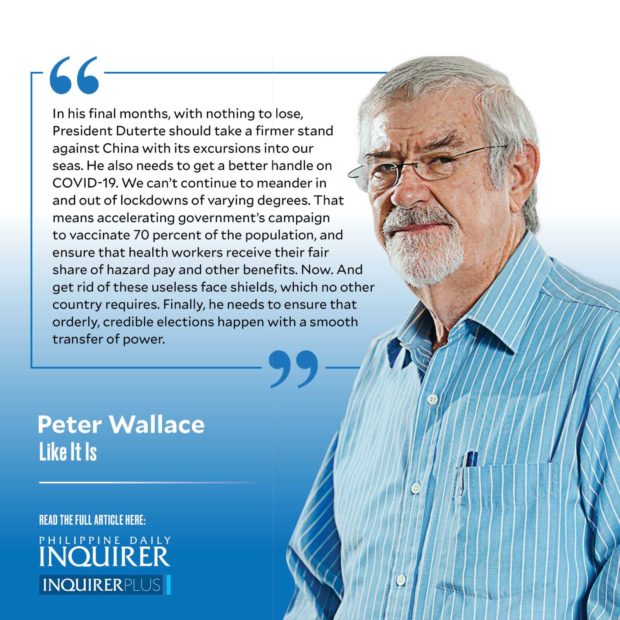
In my column last week, “A balanced view,” I summarized how I evaluated the President’s performance during the five years he’s been in power. He has 10 months left in which he could still take some meaningful actions. The reality is, though, that much of those remaining months won’t see much done — unless he forces it. Certificates of Candidacy are filed starting Oct. 1, then campaigning kicks in, and the Congress mindset shifts to “more important” things — reelection. Even administrative work slows but doesn’t disappear.
Which means he should focus only on some really important ones for fundamental change, and on ones that can be achieved.
One is a constitutional change to remove the economic restrictions in the Constitution. Some of those restrictions were introduced in the horse and buggy days of 1935 and unchanged since. This one won’t be easy to get through, but it’s so important that it must be tried. And not by an ineffectual “unless otherwise provided by law” insertion but removed entirely. A positive signal must be given to investors, that only removing the restrictions will do.
The bills in Congress where passage is possible, and so must be pushed, are the amendments to the Public Service Act, amendments to the Foreign Investments Act of 1991, amendments to the Retail Trade Liberalization Act of 2000, the Government Financial Institutions Unified Initiatives to Distressed Enterprises for Economic Recovery bill, the amendments to the build-operate-transfer law, amendments to the bank secrecy law, and the freedom of information bill. There are other bills that are important, but let’s stick to a realistic few that have a chance of passage.
To bludgeon these through, the President should follow Fidel Ramos’ example of holding and presiding over weekly Legislative-Executive Development Advisory Council meetings. Have everyone focus on the same things, strive to get them through, and rigorously monitor progress and be accountable for the results.
Outside of Congress, there’s much he can achieve in improving the administration. First is bringing the bureaucracy into the modern world by eliminating paper and, sometimes, sticky hands. The smartphone rules the world today; everything can be done from it, with increasing capability as each new model emerges from its cocoon. All transactions in government must be digitized. At the head of it all is the Department of Information and Communications Technology (DICT). It is that department’s role to lead and pull it all together in a seamless, holistic manner where the public never has to meet anyone, and just has to pick up a phone.
It’s a huge task that must really accelerate in the next administration. What the Duterte administration can do is complete its Ease of Doing Business framework between the government and business. This is progressing well with the DICT, Department of Trade and Industry, and Anti-Red Tape Authority, all working well together to achieve a system introduced into all local government units and adopted by all national government agencies. But it needs some expert outside assistance, and the President to clear the path for an early conclusion.
Agriculture needs a complete change of mindset to give it the importance that providing our food must have. That will be the next administration’s task. This one, though, can do one thing: modify the Comprehensive Agrarian Reform Law of 1988. It’s been, quite frankly, a disaster. While some crops grow well on small plots, others like sugar, bananas, and pineapples need a large-scale plantation for efficiency. National Scientist Raul Fabella indicated in his study that poverty incidence in Comprehensive Agrarian Reform Program (CARP) areas is 54 percent, while among non-CARP farmers it’s a lower 35 percent. Surely that says it all.
It would help if all Filipinos had their national ID connected to all government services before Mr. Duterte steps down. But that won’t happen, unless he calls in private sector assistance.
To give us reliable renewable energy into the future, he needs to sign the recommendation on introducing nuclear power to the grid. That proposal has been sitting on his desk since December.
In his final months, with nothing to lose, he should take a firmer stand against China with its excursions into our seas.
He also needs to get a better handle on COVID-19. We can’t continue to meander in and out of lockdowns of varying degrees. That means accelerating the government’s campaign to vaccinate 70 percent of the population, and ensure that health workers receive their fair share of hazard pay and other benefits. Now. And get rid of these useless face shields, which no other country requires.
Finally, he needs to ensure that orderly, credible elections happen with a smooth transfer of power.

